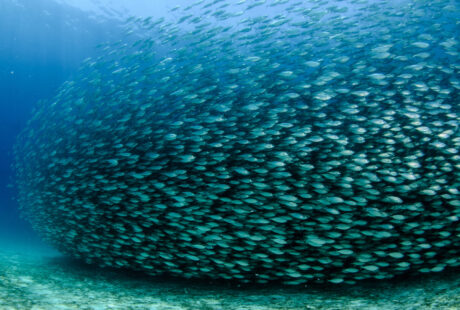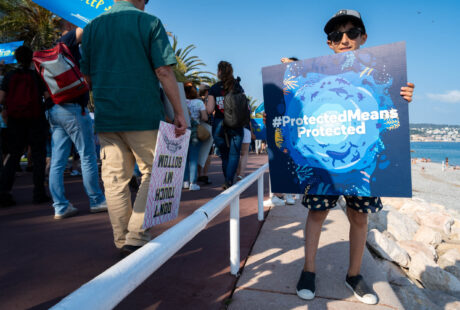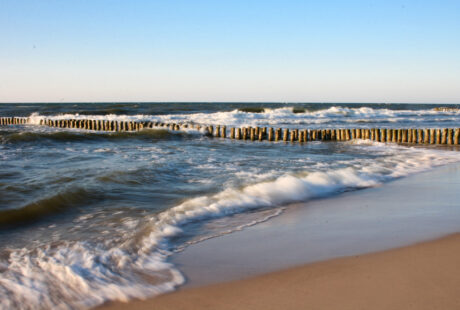The interaction among the ocean, fisheries and climate change is not unidirectional. On the one hand, the ocean, fishes and small-scale fisheries are undoubtedly affected by the increasing negative impacts of climate change. On the other hand, overfishing is also directly contributing to the climate breakdown, making fishers, the marine flora and fauna more vulnerable and susceptible to a changing climate. A recent scientific editorial titled “How overfishing handicaps resilience of marine resources under climate change”, co-authored by Rashid Sumaila, with the support of over 40 scholars, joins the dots among the scientific findings published in the past decade, and investigates whether ending overfishing is climate action. Its conclusion is a wake up call.
Fishing on depleted fish stocks requires more fuel than fishing on abundant fish stocks, as less fish in the ocean forces fishers to search longer, go further out and use heavier gears to catch the fish. Thus, the fisheries’ carbon footprint increases when fish populations are not replenished. The extra carbon emitted into the atmosphere in order to catch the fewer fish aggravates climate change, and is seen through a rise intemperature, ocean acidification, and deoxygenation. This, in turn, disturbs fish populations’ reproduction and migration patterns, ultimately further impacting fisheries. The scientific editorial also stresses how restoring depleted fish stocks would produce a win-win-win situation for the climate, marine ecosystems and fishers. First of all, the larger fish biomass would enable the ocean to sequester more carbon, increasing its climate change mitigation. Secondly, more fish would also make ecosystems healthier and more climate-resilient, as they are more likely to withstand the negative impacts of climate change when they are in healthy conditions. And stronger marine ecosystems would be an important asset for fishers.
So, yes, ending overfishing is climate action.
Despite the legally binding deadline foreseen to end overfishing for all EU fish stocks by 2020 at the latest, in 2023 the health of the EU fish populations is far from being satisfactory. Overfishing has been, for years, the rule rather than the exception and it is still widely practiced across all the EU waters. In fact, although the Northeast Atlantic saw a good improvement in the last few years, several of its commercial fish populations remain overfished and all others are far from being as healthy as pre-industrial levels. The Baltic Sea ecosystem is in severe distress and traditional Baltic fish populations are on the verge of collapse due to decades of continued overfishing on already critically depleted stocks. The Mediterranean Sea owns the rather depressing record of being one of the most overfished seas in the world, with 72% of assessed stocks currently overfished.
Even though overfishing was made illegal in 2020, EU Fisheries Ministers continue to set fishing limits above the amount given by the best available scientific advice, favoring short-term considerations over a long-term vision. As previously stated, the ocean is key to climate mitigation, however the current system, as it stands, fails to factor in climate-related criteria. This legislative gap is heavily stressed by scientists who call on policy makers to urgently reform the fisheries management to allow the ocean to play its crucial role in mitigating climate change. Yet, instead of protecting marine life, governments’ harmful subsidies sustain fishing activities even when fish catch rates are plummeting due to over exploitation, directly undermining the ocean carbon storage potential and its resilience towards climate change.
We need to rethink the way we consider fish. Fish are not merely food. Fish are a crucial part of the carbon cycle: a fundamental element that keeps the climate stable. It is time to acknowledge the role of fish as climate mitigators, and align fisheries management with this new conception before it is too late. Multiple examples unfortunately show that collapsed fish populations caused by persistent overfishing may fail to recover. This leads not only to the loss of biodiversity but also to the loss of a powerful natural climate mitigation tool. The number of natural solutions adopted to promote carbon sequestration often focus on terrestrial or coastal ecosystems, like restoring forests or protecting mangroves. The opportunities offered by the ocean have rarely been considered, despite the ocean being a major natural carbon sink.
In the coming months, EU Fisheries Ministers will set fishing quotas for the Baltic and North East Atlantic, and establish fishing limits for the joint fish stocks with the UK and Norway. Ministers must acknowledge the role of fish as climate mitigators and set fishing limits well below the advice provided by the scientific body of the International Council for the Exploration of the Sea. In fact, this scientific advice primarily considers factors like fish biomass, but it doesn’t fully take into account the risks linked to the negative impacts of climate change on fish populations, nor the positive impact of fish population as climate mitigator. In the context of international ocean governance, with talks resuming at the upcoming COP28, the EU must lead to include the powerful untapped solutions offered by the ocean to better counter climate change, in particular, the exploitation of the role of fish and marine life as massive natural carbon storage.
Fishes and marine life are one of our best allies to counter climate change, but their full climate mitigation potential needs to be freed. Embracing this powerful change would allow us to move from the vicious to the virtuous circle. Replenished fish populations would make marine ecosystems more resilient to the negative effects of climate change, lower greenhouse gas emissions and increase the ocean’s carbon storage. Ending overfishing is climate action!
Posted on: 10 October 2023



